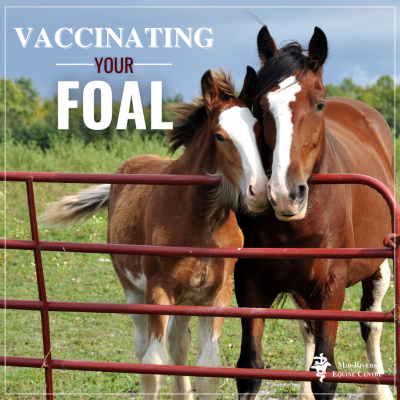Vaccinations
 Foals should begin receiving their first core vaccinations at 6 months of age. The American Association of Equine Practitioners (AAEP) recommends tetanus, Eastern/Western Equine Encephalomyelitis (EEE/WEE), West Nile Virus, and Rabies. Help keep your vaccine schedule on track by downloading AAEP’s complete Foal Vaccination Cart with expanded details, booster timelines, and information on risk-based vaccines at AAEP .
Foals should begin receiving their first core vaccinations at 6 months of age. The American Association of Equine Practitioners (AAEP) recommends tetanus, Eastern/Western Equine Encephalomyelitis (EEE/WEE), West Nile Virus, and Rabies. Help keep your vaccine schedule on track by downloading AAEP’s complete Foal Vaccination Cart with expanded details, booster timelines, and information on risk-based vaccines at AAEP .The frequency in which horses are vaccinated depends on their risk of encountering a large number of the disease-causing organisms. With regards to many respiratory tract diseases, risk is increased for most horses in areas where they congregate (shows, trail rides, etc.) For other diseases, such as encephalomyelitis (‚Äúsleeping sickness‚Äù) or tetanus, all horses in a given area are basically at equal risk. It is important to note that vaccines are ideally administered when the need for immunity against a disease is at its highest. For example, diseases carried by insects like West Nile, Potomac Horse Fever, and Eastern and Western Encephalomyelitis should be vaccinated against in the springtime each year.
That depends on several factors. What do you do with your horse? Does your horse travel to shows, events, or trail rides? How old is your horse? For a recommended vaccination program, please refer to our Vaccinations page.
Not exactly. Your foal will likely receive similar vaccines as your adult horses, but since they have not been vaccinated previously, they generally need at least two doses of each type of vaccine to develop the optimal protection. Please ask your veterinarian about the age at which your foal needs to begin vaccination programs. After an initial period of vaccinations and follow up boosters, your foal will join the rest of the herd in their normal schedule.
Two vaccinations are required before your horse can enter USEF competitions: IEV (influenza) and EHV (Rhinopneumonitis)
Vaccines allow the horse’s immune system to get a head start in the fight against certain diseases. They expose the horse to inactivated versions of disease-causing organisms and allow the body to develop stronger natural defense systems.